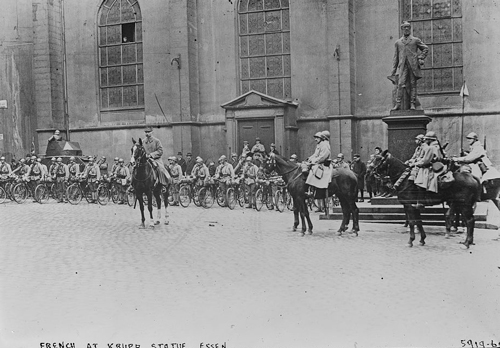Pope urges moderation in Allied policy towards defeated Germany
Rome, 28 June 1923 - Pope Pius XI has weighed in on the German reparations question and condemned the ongoing French occupation of the Ruhr.
In a letter issued on his behalf by his Papal Delegate, Cardinal Gasparri, the Pope made clear his view that ‘more should not be asked of the debtor than he can give without completely exhausting his resources and his productive power to his own irreparable detriment.’
In a further expression of displeasure at the current state of affairs, the Pope has made a donation of 500,000 lira for the relief of distress in the Ruhr and has visited Herr Krupp von Bohlen, in prison. The president of the Krupp Works was arrested by the French at the beginning of May.
The letter issued on behalf of the Pope states that the Vatican felt it its duty to ‘raise a voice disinterested, impartial and benevolent for all, as that of a common father should be, at the same time reflecting on the grave responsibility which evolves upon us and upon all those who hold the destinies of the peoples in their hands.’
‘We entreat them once more to consider the various questions and that of reparations in the Christian spirit, which does not separate the exigencies of justice from those of social charity on which the perfection of the life of peoples is based.’
Pathé newsreel footage of the French occupation of the Ruhr region in 1923
As well as urging the Allied Powers to temper their reparations demands on Germany, the message from the Pope as to the inappropriateness was unambiguous. The letter encourages the creditor powers to consider if it is necessary to ‘maintain in every case territorial occupations which impose grave sacrifices on the occupied countries, and whether it would not be better to substitute for such occupations, even though only progressively, other guarantees not less efficacious and certainly less painful. If both parties came to an agreement on these pacific bases it would not be long before the territorial occupation was mitigated.’
The spirit of charity and conciliation advocated by the Papal letter is one very much at odds with the current policy trajectory. Indeed, it is being reported that French General Degoutte has issued an order to the effect that German regulations will not be applicable to the Ruhr region and that all bank officials and others who look to apply the orders from Berlin will be placed on trial before court martial with a potential penalty of five years’ imprisonment and a fine of 2,000 million marks. In a related development, six hundred railwaymen and their families have been expelled from the Mayence region and their furniture seized by the French authorities.
[Editor's note: This is an article from Century Ireland, a fortnightly online newspaper, written from the perspective of a journalist 100 years ago, based on news reports of the time.]





















